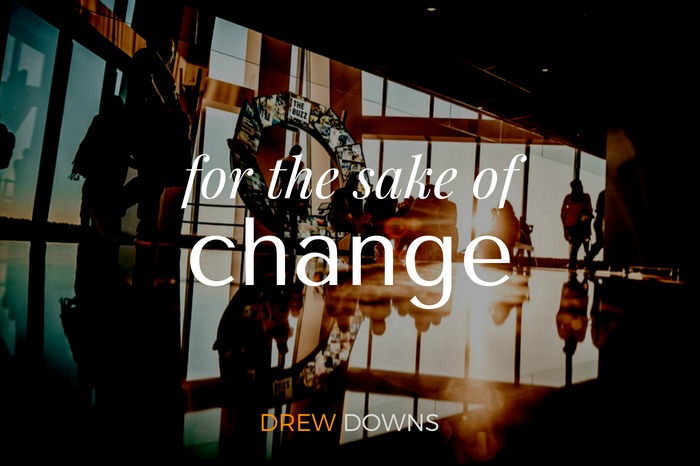The phrase is all too common: change for the sake of change. But we don’t actually mean it. We’re trying to say something else without having to say it.
People like to say that we shouldn’t change for the sake of change. But it isn’t really true. We often change for the sake of change.
We change our toothbrushes every three months.
Our oil every 3-5,000 miles
Our socks every day
We change a lot of things just to change them. Because changing them can be objectively good.
But there are reasons to do these things!
You might say.
That isn’t changing for the sake of change. That’s changing for health and maintenance. That’s totally different.
But isn’t that the whole point?
By that definition there is literally nothing in the world that has ever been changed for the sake of change.
When we use the phrase “change for the sake of change” we are being intellectually dishonest. We use two different understandings interchangeably when it is convenient.
Two Meanings
When we warn about change for the sake of change, we’re usually warning about hasty and dramatic change. Perhaps unplanned or poorly reasoned change. We want a really good reason, purpose, and plan for our change.
Of course many of our routine changes are unplanned beyond “it’s time to change.” It’s been 3 months, 3000 Miles, or I just took a shower.
Or the changes are simple and automatic. I need a clean brush, clean oil, or my feet not to stink.
In this way, many of our best decisions come from well-planned automatics. Things which look like change for the sake of change when we define it that way.
On the other hand, we don’t use this same expectation on a status quo we particularly like, such as a favorite pillow we have to travel with or taking a detour on the way to work which only adds about 90 seconds to the commute. And we certainly complain about corporate logo updates and the discontinuing of favorite burgers.
But if we take the phrase in its other meaning, the literal meaning, then none of these was without a purpose. We might not like the purpose, but there was at least one reason.
So either we don’t really mean we oppose change for the sake of change or nothing is changed for the sake of change and the phrase itself has no meaning.
Making Change Intentional
This is why I hate the phrase “change for the sake of change” because it’s a copout. We use it knowing that people have reasons for change and we’re telling them that we just don’t like their reasons. Or worse: we don’t even respect them enough to consider them reasons. We ascribe motive and negative intent. Or maybe we’re just being careless with our speech.
The phrase is based on an unjustified fear: that people don’t actually have a good intent for their change. That they haven’t thought it through or aren’t doing their best. It’s derogatory and distrustful.
Refusing to “change for the sake of change” is also really, really bad strategy. Systems need to go through regular change to maintain institutional health. So we need regular, intentional change to remain healthy.
Many sound decision are made because a group has focus, an expert has developed a sound plan for us, or the sense of immediacy has sprung us into action. We changed the toothbrush because we dropped the old one in the toilet. We changed the oil because we’re going out-of-town. Or maybe we wanted to wear our fun socks today.
And many changes only seem to happen quickly, but come with a wealth of experience, intention for growth, or to seize an opportunity.
Besides, everything has intent. Health, maintenance, even boredom. Really, is there any better reason to change than boredom?
Maybe that’s why you don’t finish reading this post. If you’re bored, change the channel.
Or better yet, commit to only watching or reading what you enjoy. Then purposeful changing for the sake of change (or your pleasure) will be built right in.

